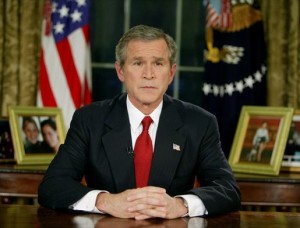Source: Consortium News

President George W. Bush and Official Washington's neocons are gifts that keep on giving, at least to America's terrorist enemies. The Shiite-Sunni sectarian conflict that Bush and his neocon advisers stirred up by invading Iraq in 2003 has now engulfed the entire region and has given al-Qaeda and its affiliates footholds in countries where they hadn't existed before the Iraq War.
But the Washington Post's neocon editorial page, which served as the bullhorn for the Iraq War's advocates, has figured out who's to blame for the deepening mess in the Middle East: President Barack Obama -- for not continuing the U.S. military occupation of Iraq and not intervening more aggressively in Syria to help overthrow President Bashar al-Assad.
The Post's version of history -- as expressed in a lead editorial on Sunday -- follows the neocon narrative that begins in 2007 with President Bush's supposed "victory" in Iraq, which President Obama then allegedly squandered by completing the withdrawal of U.S. troops in 2011. According to this neocon narrative, Bush's "surge" had defeated al-Qaeda forces in Iraq before the feckless Obama threw all that hard-won success away.
Left out of the Post's narrative is the fact that al-Qaeda didn't exist in Iraq (or in many other places outside of a few remote areas of Pakistan and Afghanistan) until Bush -- with the enthusiastic support of the Post's editorial page -- invaded Iraq in 2003 and destroyed the delicate balance between Sunni and Shiite sectarian interests across the Middle East. Before and during the war, the Post also helped spread a lot of lies to the American people.
To rile up the American public still traumatized by the 9/11 attacks, Bush and the neocons had pretended that al-Qaeda was in league with Iraqi dictator Saddam Hussein who was planning to give the terrorists some of his vast stores of WMD. Thanks to the complicity of the Post and other major U.S. news outlets, the public heard almost no dissent to this false narrative. Not only was the secular Hussein a fierce enemy of al-Qaeda's brand of Sunni extremism but he had long ago destroyed his WMD stockpiles.
But Bush and the neocons got their invasion of Iraq nonetheless. They ousted Hussein, a Sunni, and replaced him with another authoritarian regime led by Prime Minister Nouri al-Maliki, a Shiite. The sectarian power shift in Baghdad and the U.S. military occupation transformed the Sunni-dominated territories of western Iraq into fertile ground for al-Qaeda, which also understood that keeping American forces tied down in Iraq would keep attention away from the surviving al-Qaeda leaders, including Osama bin Laden, holed up in Pakistan.
Through Bush's last five years in office -- amid intense anti-Americanism over the Guantanamo Bay prison and exacerbated by the U.S. invasion of Iraq -- al-Qaeda affiliates began popping up in other Sunni countries, including Yemen and Libya, while retaining a foothold in Iraq despite many Sunni tribes joining in the fight against the extremists in 2006.
Much like how Saudi national Osama bin Laden got his start in the 1980s in Afghanistan, this spreading Sunni extremism was largely financed by Saudi Arabia and other Persian Gulf sheikdoms. (The section of the 9/11 Commission's report about Saudi assistance to al-Qaeda remains classified to this day.)
In recent years, Saudi Arabia again saw the value of supporting militant Sunni factions as a way to counter the growing influence of Shiite-ruled Iran, which had developed close ties with the Maliki government in Iraq and thus had extended the Shiite Crescent from Tehran through Baghdad and Damascus to Beirut, Lebanon.
The Saudi-Israel Tandem
The Saudis also began a behind-the-scenes collaboration with Israel despite historic animosities between the two countries. Increasingly, Saudi Arabia and Israel shared a strategic outlook that saw Iran as their principal enemy and favored covert means for shattering the Shiite Crescent, including Saudi assistance to Sunni jihadist forces seeking to overthrow Syria's President Bashar al-Assad, who is an Alawite, a branch of Shiite Islam.
Last September, Israel's Ambassador to the United States Michael Oren embraced Saudi Arabia's violent strategy in Syria when he announced that Israel would prefer to see the Saudi-backed jihadists prevail in Syria over the continuation of the Iran-backed Assad regime.
"The greatest danger to Israel is by the strategic arc that extends from Tehran, to Damascus to Beirut. And we saw the Assad regime as the keystone in that arc," Oren told the Jerusalem Post in an interview. "We always wanted Bashar Assad to go, we always preferred the bad guys who weren't backed by Iran to the bad guys who were backed by Iran." He said this was the case even if the other "bad guys" were affiliated with al-Qaeda.
So, one could view the mess in the Middle East through the prism of Bush's rash invasion of Iraq and the neocons' reckless meddling that had destabilized the region. But the Post's editors chose to start their narrative's clock much later, all the better to absolve themselves and shift the blame to Obama for not toeing the neocon line and engaging in more military interventions over the past five years.
In the editorial on Sunday, entitled "A slow-motion conflagration," the Post's editors wrote that...
(Note: You can view every article as one long page if you sign up as an Advocate Member, or higher).





